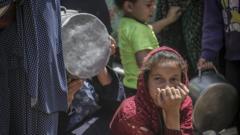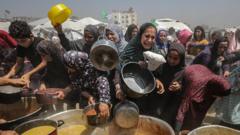As Israeli leadership emphasizes military actions against Hamas, internal reports signal an urgent humanitarian crisis looming within the enclave.
Israeli Military Officials Warn of Impending Starvation Crisis in Gaza

Israeli Military Officials Warn of Impending Starvation Crisis in Gaza
Amidst ongoing conflicts, concerns grow within the Israeli military regarding food shortages in Gaza as aid blockades continue.
In recent discussions, some Israeli military officials have expressed grave concerns that the population of Gaza could soon face widespread starvation unless humanitarian aid deliveries are reinstated imminently. This stark warning comes in contrast to the Israeli government’s public stance downplaying the severity of the blockade on food and fuel, which has been in effect for months.
Sources familiar with the internal assessments indicate that while officials have publicly maintained that the blockade does not pose a significant threat to civilian life, the dire humanitarian situation has prompted a reevaluation behind closed doors. In fact, recent evaluations have shown that unless solutions are implemented to resume aid deliveries quickly, many parts of Gaza may soon lack enough food to fulfill the minimum daily nutritional requirements for its residents.
Military analysts have emphasized the importance of swiftly restoring humanitarian supply chains, as the logistical process typically requires time to ramp back up. This growing acknowledgment of a potential hunger crisis within the context of Israel's ongoing military campaign against Hamas highlights the complex intersection of humanitarian needs and national security.
In the backdrop of this unfolding crisis, Prime Minister Benjamin Netanyahu has reaffirmed his intention to escalate military operations in Gaza, reiterating the goal of dismantling Hamas and recovering hostages. His remarks coincided with President Trump's recent diplomatic trip to Saudi Arabia, which notably excluded a visit to Israel, indicating a widening rift between the two leaders on key security matters.
The timeframe to avert a humanitarian catastrophe is rapidly shrinking as Israeli officials grapple with the realities of the blockade's consequences while trying to balance their military objectives in the region.
Sources familiar with the internal assessments indicate that while officials have publicly maintained that the blockade does not pose a significant threat to civilian life, the dire humanitarian situation has prompted a reevaluation behind closed doors. In fact, recent evaluations have shown that unless solutions are implemented to resume aid deliveries quickly, many parts of Gaza may soon lack enough food to fulfill the minimum daily nutritional requirements for its residents.
Military analysts have emphasized the importance of swiftly restoring humanitarian supply chains, as the logistical process typically requires time to ramp back up. This growing acknowledgment of a potential hunger crisis within the context of Israel's ongoing military campaign against Hamas highlights the complex intersection of humanitarian needs and national security.
In the backdrop of this unfolding crisis, Prime Minister Benjamin Netanyahu has reaffirmed his intention to escalate military operations in Gaza, reiterating the goal of dismantling Hamas and recovering hostages. His remarks coincided with President Trump's recent diplomatic trip to Saudi Arabia, which notably excluded a visit to Israel, indicating a widening rift between the two leaders on key security matters.
The timeframe to avert a humanitarian catastrophe is rapidly shrinking as Israeli officials grapple with the realities of the blockade's consequences while trying to balance their military objectives in the region.





















